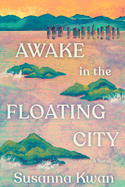
Artist/writer Susanna Kwan turns her native San Francisco into a watery wasteland in her elegiac debut novel, Awake in the Floating City. After seven years of rain, the third floor is now the ground floor in the high-rise where Chinese American artist Bo rents a 77th-floor studio. Most everyone she knows has left, "gone to Greenland or Siberia or Maine." Her cousin Jenson, in British Columbia, wants to extricate her, ever since "the big storm" swept her mother away. Her art has completely stalled.
But a handwritten note slid under her door is desperation Bo can't ignore: "I need help.... Three days a week, afternoons. Can pay in cash." Mia, a Chinese immigrant on the 51st floor, is a "supercentenarian"--about 130 years old--one of the elderly who "found themselves abandoned by family to survive personal and regional crises alone." Bo's appearance at Mia's door begins a relationship that will be renewing for Bo, soothing for Mia, and undeniably transformative for both.
Kwan nimbly constructs a dystopic San Francisco populated by the leftover few. Impermanence is delicately threaded throughout--disappearing landscapes, buildings, landmarks, records, archives. But Kwan also deftly intertwines centuries of Asian American history--the Chinese Exclusion Act, Angel Island, Executive Order 9066, ethnic studies, widespread anti-Asian hate--tracking the challenges of being repeatedly rejected, exoticized, misrepresented, othered. Even as communities dwindle, people remain connected to the past--witnesses to suffering, claimants to joy. Hearing Mia's endless stories reinvigorates Bo's need to create, and Mia's memories, "twisted with hers," gives Bo the clarity to consider "her future, ready to be met." --Terry Hong

